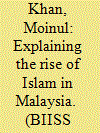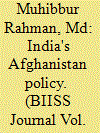|
|
|
Sort Order |
|
|
|
Items / Page
|
|
|
|
|
|
|
| Srl | Item |
| 1 |
ID:
132376


|
|
|
|
|
| Publication |
2014.
|
| Summary/Abstract |
Bangladesh and China are partners in the new Asian Age. Both countries enjoy time tested, all weather relations and friendship. Though this relationship is rooted in history, but like all relationships between states, it also has to be renewed and reinvigorated from time to time. Therefore, it has become imperative to analyse this relationship in order to find out ways to improve this excellent relationship even further. Considering political, economic, diplomatic and geo-strategic perspectives, mutual interests of both countries are overlapped leading them to strengthen their friendship regardless of any domestic or international circumstances. Taking into account the significance of both countries to each other, this paper attempts to analyse the present state of relations and the importance of BangladeshChina relations from the perspective of both the countries finally, putting forward some suggestions for enhancing mutual benefits.
|
|
|
|
|
|
|
|
|
|
|
|
|
|
|
|
| 2 |
ID:
132380


|
|
|
|
|
| Publication |
2013.
|
| Summary/Abstract |
Malaysia, since the 1970s, saw a trend of increasing adoption of Islamic values both at private and public levels, often referred to as the Islamic resurgence. This has led to an academic interest whether this upsurge of Islam in that country has been driven mainly by Islamic ideology that aims at establishing a universal Islamic order or other circumstances specific to Malaysia. This paper seeks to provide an illuminating explanation to this riddle. Having reviewed the trends of Islamic profile and the main reasons behind it, this paper finds that the ethnic conflict over material interests between the local Malays and non-Malays, political rivalry between two main parties, UMNO and PAS and the consequences of widening gap between the rich and the poor as a result of massive economic programmes, have all prompted the urge for mounting Islamic profile. Had there been no such competition, Islam would have remained marginalised as happened till the 1970s. However, in later times, Islam came as a means or instrument to express discontent by these competing interest groups towards each other. The key element of this analysis is to show that it is context that has largely stimulated the profile of Islam in Malaysia rather than eagerness, the inherent association with Islamic ideology, to establish an Islamic state and a universal order. Findings of this paper reinforce the view that Islam is not necessarily one and uniform and is not essentially linked to politics of ruling and resisting.
|
|
|
|
|
|
|
|
|
|
|
|
|
|
|
|
| 3 |
ID:
132378


|
|
|
|
|
| Publication |
2013.
|
| Summary/Abstract |
Regional security dynamics undergo significant transition with the shifting alliance formation within the geopolitical setting of South Asia. Traditional 'balance of power' argument sees a potential for stability in the emerging distribution of power, whether it is a 'unilateral hegemonic distribution' or a 'pluri-lateral bipolar or multi-polar distribution'. But a growing Indo-Afghan partnership in South Asia offers, as the paper argues, a more complicated case. Indian stronghold in Afghanistan is enhancing already asymmetric distribution of power in the region, granting a more favourable power balance for India allowing the country to pursue its objective of emerging as a major world power. The maturing of Indo-US defence ties and the US approval of Indian stronger presence in Afghanistan provide India with enlarged incentives and enthusiasm to dominate the regional security matters. On the other hand, Pakistan's critical stake in Afghan security and its likely antagonistic reaction to Indian pre-eminent position in the region might lead to prolonged instability in South Asia. Besides, China's growing presence in Afghanistan and Central Asia will also complicate India's regional leadership potential. The paper makes an attempt to assess the competing claims on the regional ramifications of India's Afghan policy in South Asia with a view to unravelling emerging security atmosphere in the region in the wake of US withdrawal of troops from Afghanistan in 2014.
|
|
|
|
|
|
|
|
|
|
|
|
|
|
|
|
| 4 |
ID:
132377


|
|
|
|
|
| Publication |
2013.
|
| Summary/Abstract |
Bangladesh is geographically located between two Asian economic power houses - China and India. The gravity model of international trade theory implies that geographical proximity leads to higher volume of bilateral trade. However, very little or no trade takes place among the smaller countries in South Asia that are closely located even though individually they trade more with distant industrialised countries. This clearly implies that there may be other factors, such as lack of transport connectivity and related logistical constraints that give rise to high transaction costs leading to low trade. Nevertheless, Bangladesh has the potential to establish itself as a regional economic and financial hub. It has also been stipulated in the Vision 2021 of the Government of Bangladesh and demonstrated political will through a number of initiatives. Given this backdrop, this paper tries to explain the avenues for tapping the potential of Bangladesh's location through greater connectivity. It also attempts to uncover the whole issues of connectivity given the locational advantage of Bangladesh, identifies the existing bottlenecks that are hindering in deriving multiple economic benefits and suggests how to address these constraints. It reveals that the country has got unique location in the middle of two economic power houses, which, if wisely utilised, can provide wide ranging benefits to vibrate economically.
|
|
|
|
|
|
|
|
|
|
|
|
|
|
|
|
| 5 |
ID:
132379


|
|
|
|
|
| Publication |
2014.
|
| Summary/Abstract |
This paper discusses the anti-corruption regime of the World Bank and the processes of mainstreaming good governance and anti-corruption programmes in the core functions of the Bank. The major question that the paper answers: how effective the World Bank is in combating corruption in the context of its global aid regime. The paper describes the effectiveness as it is measured by the existing indicators of the World Bank's performance appraisal set by the Bank and other critical secondary literatures. The sequence of the paper is: first it describes the World Bank's approach to combating corruption and the different anti-corruption initiatives of the Bank and its institutional framework to fight corruption in the recipient countries. It then analyses the mainstreaming of anticorruption considerations into the Bank's operational framework. This discussion also deals with the country specific experiences of the World Bank in promoting anti-corruption and good governance measures. Finally, the paper explains the major challenges that the World Bank experiences in implementing its anticorruption regime. Although the Bank has achieved significantly in combating corruption, the investigation through this paper reflects the fact that the Bank fails to address the political consequences of combating corruption in some cases. The Bank has failed to create a long-term political commitment among the recipient countries to fight corruption in exchange for Bank's development assistance. The paper suggests that the Bank should focus more on protecting the integrity of its development funds and plan long-term anti-corruption policy measures, thereby utilising funds properly in reducing corruption.
|
|
|
|
|
|
|
|
|
|
|
|
|
|
|
|
|
|
|
|
|